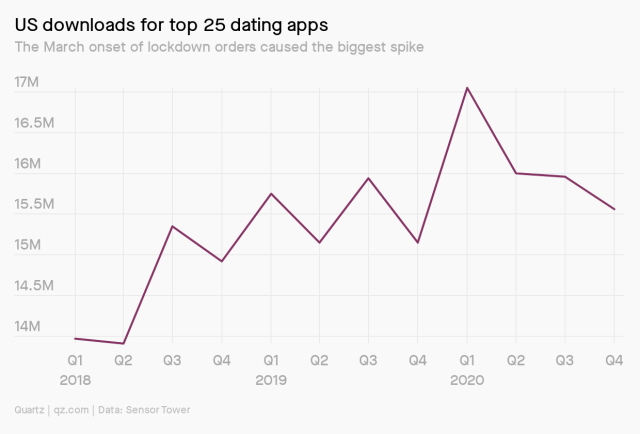How online dating companies have helped people find love, even during a pandemic

The Big Idea
Helping people find love is a multi-billion-dollar global industry, especially during the pandemic.
Here’s why
1⃣ Dating apps have long relied on the “freemium” business model to entice—and eventually upsell—users. 2⃣ During the pandemic, lots of people downloaded dating apps, 3⃣ and are using them to look for love across international borders. 4⃣ In India, dating apps are becoming more popular outside urban centers as dating becomes more acceptable. 5⃣ Companies are hoping that, in the future, their offerings are less fatiguing.
The details
1⃣ Dating apps have long relied on the “freemium” business model to entice—and eventually upsell—users.
Over the last quarter-century, online dating went from a stigmatized activity discussed in hushed, embarrassed tones to the most common way couples meet in the US. It has completely, unequivocally revolutionized how we fall in love—and turned into a multi-billion-dollar global industry in the process.
Because the apps are free—and most users still use free versions—there is no barrier to entry. The company, initially backed by investors, builds up a large user base, and is then able to introduce a premium offering. Those who want more out of the apps can pay. And a growing number of users are happy to fork over a couple of bucks at a time, or the equivalent of a fancy cocktail or a newspaper subscription, to have all the paid options all month.
2⃣ During the pandemic, lots of people downloaded dating apps.
The industry is estimated to have 270 million monthly users globally and grew by about 13% even in the pandemic-dominated year of 2020 (although the pace of growth is slowing). Everyone is dating online, even 18-year-olds in high school.
3⃣ People are using them to look for love across international borders.
In the early days of the pandemic, Tinder users, stuck at home, started teleporting themselves en masse into other countries to check out the dating pools far away from home, and maybe engage in some cross-border flirtation. They weren’t physically there, of course, but the app’s “Passport” feature allowed them to change their location and indulge in the fantasy.
A seemingly growing number of people are inspired to date beyond their immediate physical community. For better or for worse, the “borderless” trend on online dating apps has been percolating for some time, with the pandemic giving it a boost. Will it continue when people can meet up in person again?
4⃣ In India, dating apps are becoming more popular outside urban centers as dating becomes more acceptable.
There are two ways of getting married in India, depending on how conservative your family is: You can either let your parents arrange a match for you, or you can try to find a match yourself.
The latter path is only for the free-willed and adventurous, especially in small-town India, where dating is still a fairly new social phenomenon that carries a lot of stigma. Casual dating and hookups are frowned upon, and, depending on the city or district you are in, can even lead to physically dangerous repercussions like harassment from the police, or worse, honor killings.
And yet, despite this cultural resistance, dating in India is becoming big business. The country has an estimated 38 million people on dating apps and is second only to the US in terms of the revenue it generates. And Covid-19 proved a boon. Lockdowns sent urbanites home to smaller towns and cities for months on end, helping apps make headway into markets they had previously found difficult to crack.
5⃣ Companies are hoping that, in the future, their offerings are less fatiguing.
A lack of responses, deceptive profiles, scams, racist comments, discrimination, harassment, and profiles that were more confusing or cliche than engaging—these fatiguing aspects of the online dating experience have existed as long as sites have. They put people off the apps or sites, undercutting a company’s bottom line. So the companies are looking to make dating online more enjoyable by fostering niche and organic communities, and adding paid features to boost meaningful engagement and visibility with desirable matches.
Read the field guide
Sign up for the Quartz Daily Brief, our free daily newsletter with the world’s most important and interesting news.
More stories from Quartz:
Everyone should worry that Indians aren’t taking their second vaccine doses
Kamala Harris’s persistent decade of duking it out with oil companies


